The John R. Locke Memorial
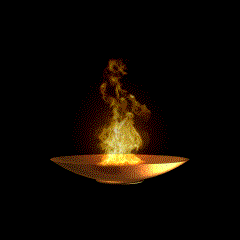 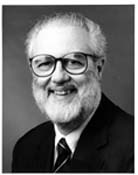 
BORN: MAY 30, 1933
DIED: AUGUST 28, 2000
If you adhere to what is
taught by your teacher,
your life will be full of happiness.
Dhammapada 6:79 ("The Wise Person")
Him the sun does not
illumine, nor the moon, nor the stars, nor
the lightning--nor, verily, fires kindled upon the
earth. He is
the one light that gives light to all. He shines;
everything
shines.
Katha Upanishad 5.15; Mundaka
Upanishad 2.2.10; Svetavatara Upanishad
6.14
There is a place where
there is neither earth, nor air, nor fire,
nor water, where there is no consciousness, nor space,
nor void
nor perception. There is neither a coming nor a
going, neither
a standing still, nor a falling away, without being
fixed, nor
without moving, without basis.
It is the end of suffering.
--Buddhacarita

Venerable Ananda went to
the house, leaned against the doorpost and wept,
saying: "I am still but a learner. I still have to
attain perfection. But alas,
my master who is so compassionate towards me is about to
pass away." Then the
Lord asked the monks: "Where is Ananda?" And they told
him where he was and
what he is doing. Then the Lord said: "Go monk, and say
to Ananda, 'Friend
Ananda, the Lord calls you.'
When he came, the Lord said to Ananda: "Enough Ananda,
do not cry. For
have I not taught that it is the nature of all things
beloved that we must
suffer separation from them and be severed from them?
For that which is born,
come to be and compounded is also subject to
dissolution. How could it be
otherwise? For a long time have you, Ananda, served the
Tathagata with
thoughts, words and deeds of love, graciously,
pleasantly and with your whole
heart. You have gathered great good. Now you should put
forth energy and soon
you too will be free from the defilements."
from Buddha Vacana compiled
by Venerable Dhammika;
published by the Buddha Dhamma Mandala Society
No Things
No things.
Just ings.
I am writing
You are reading.
We are ing.
--John Locke
from The Troika Technique:
How to See for Yourself
(title of the 1984 version)
© 1984, 1988, 2001
Michael Phillips on John Locke
John Locke, A man that I called Dad, is going to
be truly remembered in my heart. John married my mother
when I was about 5 or 6 years old. During the time they
were married he taught me the lessons of life that I
still live by today.
I keep remebering the summer he took me to Europe along
with the class he was chaporoning. We left out of our
driveway and he handed me the road atlas. He said we are
going to Brooklyn, New York to visit my mother (La La
Locke) before we leave for Europe. You are going to read
the map and get us there. I did fine until we got to St.
Louis. We got turned around and were headed to
California. He never said a word. I realized my mistake
after about 50 miles and turned us around. I was 8 years
old. The great thing about John was that he would let me
make mistakes, but most importantly he would insist that
I correct them myself.
John was a true father to me during those years. He
showed me how to be my own person, taught me how to
learn and gave me the values that today I hold so dear.
I will miss you John R. Locke. My father and my teacher.
In Loving Memory
Michael Phillips

Who
was John Locke and why is there a memorial for him?
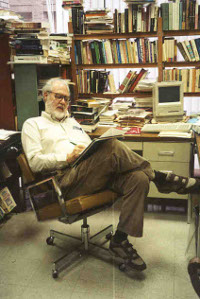 Dr.
John R. Locke, Founder & Director of Comparative
Literature at the University of Arkansas, Fayetteville,
was shot and killed in his office by a disgruntled
graduate student on August 28, 2000. A week earlier,
the student had been formally dismissed from the
Comparative Literature program for lack of progress toward
a doctoral degree after five years in the program. The
office was quickly surrounded by police, and the student
committed suicide about 15 minutes later. See "University of Arkansas,
Fayetteville shooting" (Wikipedia) for more
information. Dr.
John R. Locke, Founder & Director of Comparative
Literature at the University of Arkansas, Fayetteville,
was shot and killed in his office by a disgruntled
graduate student on August 28, 2000. A week earlier,
the student had been formally dismissed from the
Comparative Literature program for lack of progress toward
a doctoral degree after five years in the program. The
office was quickly surrounded by police, and the student
committed suicide about 15 minutes later. See "University of Arkansas,
Fayetteville shooting" (Wikipedia) for more
information.
The Democrat Gazette had a 10-year
retrospective in 2010: "Campus Shooting Evokes Memories
of Loss, Decade of Change."
A memorial (Memorial Program)
was held on September 12, 2000, and in 2003 a meditation
garden (Dedication Ceremony
Transcript) was dedicated in front of Kimpel Hall
where he taught for 33 years. The John R. Locke Memorial
Library at the Office of Dr. Virgina Krauft, an area
Analytical Psychologist, houses his 5,000 volume personal
book collection and papers. A small memorial is also at Find
A Grave.com.
Read memories and sentiments posted about this remarkable
human being on this website's archived University
of Arkansas Memorial Guestbook which was created
shortly after Dr. Locke's death.
Left: Dr. John R. Locke in his office in Kimpel Hall at the University of Arkansas, Fayetteville, Summer 2000 (Photo credit: Maeve Maddox)
To learn from John R. Locke, read The
Troika Technique (415 kb PDF download) which
is his personal distillation of his teachings and
philosophy.
Dr. Locke had an extensive personal library that he
bequeathed to psychologist Dr. Virginia Krauft, and this
collection comprises the bulk of the John R. Locke Memorial Library
in Rogers, Arkansas. The library "houses an eclectic and
extensive collection of books including German, American,
British, French, Russian, Irish, Italian, Asian, Japanese,
and Scandinavian literature and literary criticism studies
in the sciences, visual arts, anthropology, and several
books on Eastern philosophy and religion, many of them in
their original languages. The library also houses Locke’s
personal notes, lectures, and includes his “Troika
Technique,” a book on meditation, as well as his
translations of Ranier Maria Rilke’s letters, poems, and
plays" (About the Library).
Locke Handouts:
This online memorial is maintained by Joseph E. Becker,
PhD (U Arkansas, Fayetteville, 2002), who was among the
last doctoral candidates that Dr. Locke mentored and
guided from 1995-2000, and he is solely responsible for
the memorial's content. Please feel free to email
comments/corrections/suggestions/additions to
Biographical and Professional Accomplishments
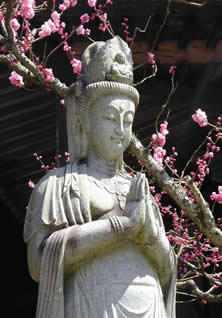
CHAIR, COMPARATIVE LITERATURE PROGRAM, 1980
- 2000
ASSOCIATE PROFESSOR OF ENGLISH
J. WILLIAM FULBRIGHT COLLEGE OF ARTS AND
SCIENCES
UNIVERSITY OF ARKANSAS 1967 - 2000
HISTORY WITH THE UNIVERSITY OF
ARKANSAS
John Locke joined the University of Arkansas in
1967 as an instructor of English and comparative
literature. In 1973 he was promoted to assistant professor
of English and comparative literature and promoted
again in 1981 to associate professor.
EDUCATION
Dr. Locke, among an extensive list of
educational accomplishments, received his Bachelors
of English from the University of Virginia in 1960. He
received his Masters in Creative Writing from the
University of Iowa in 1962. Also, he held a Masters and
Ph.D. of Comparative Literature from the University of
Iowa, 1969 and 1973 respectively.
TEACHING EXPERIENCE
Dr. Locke began his teaching career in 1961 at
Culver-Stockton College in Canton Mo. He remained there as
an assistant professor of English and modern languages
until 1964.
He was a graduate assistant in world literature at the
University of Iowa, in Iowa City, Iowa from 1964 to 1965.
He joined the University of Arkansas in 1967.
Gaps in Dr. Locke's teaching history are indicative of
additional and extensive educational pursuits.
OTHER SELECTED WORK EXPERIENCE
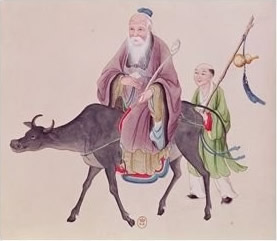 French interpreter, U.S. Army in Europe, 1953 - 1955
French interpreter, U.S. Army in Europe, 1953 - 1955
Arthur Murray Dance Teacher, Tampa, Fla. 1955 - 1956
Unit Leader, Camp Jug Hill, New York, 1960
Director of first-year French, University of Arkansas,
1968 - 1970
Director of Paris Program, Academy of International
Studies, 1970
Director of Lausanne Program, Academy of International
Studies,
summer of 1970 and 1971.
Associate Editor, STYLE, Fayetteville, Ark., 1970 - 1973
Referee, Thomas Jefferson University Press, 1988
UNIVERSITY COMMITTEES
Dr. Locke served on numerous committees while at the
University of Arkansas. Among those: Asian studies,
linguistics, French, essay writing, department cabinet of
comparative literature, world literature, freshman
English, M.F.A. search and hiring, dissertation reader of
psychology and comparative literature, honors thesis
director & reader.
CURRICULUM DEVELOPMENT: UNIVERSITY OF ARKANSAS
Development and revision of applied French linguistics
program, 1967 and 1972; revised first-year French program,
1969; introduced new courses in introduction to
comparative literature in 1969, and language and reality
in 1971.
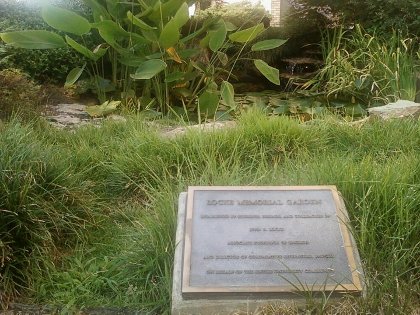
John R.
Locke Memorial Garden Koi Pool & Plaque
Summer 2010
Photo: Sloan Davis
|



 Dr.
John R. Locke, Founder & Director of Comparative
Literature at the University of Arkansas, Fayetteville,
was shot and killed in his office by a disgruntled
graduate student on August 28, 2000. A week earlier,
the student had been formally dismissed from the
Comparative Literature program for lack of progress toward
a doctoral degree after five years in the program. The
office was quickly surrounded by police, and the student
committed suicide about 15 minutes later. See "
Dr.
John R. Locke, Founder & Director of Comparative
Literature at the University of Arkansas, Fayetteville,
was shot and killed in his office by a disgruntled
graduate student on August 28, 2000. A week earlier,
the student had been formally dismissed from the
Comparative Literature program for lack of progress toward
a doctoral degree after five years in the program. The
office was quickly surrounded by police, and the student
committed suicide about 15 minutes later. See "
 French interpreter, U.S. Army in Europe, 1953 - 1955
French interpreter, U.S. Army in Europe, 1953 - 1955